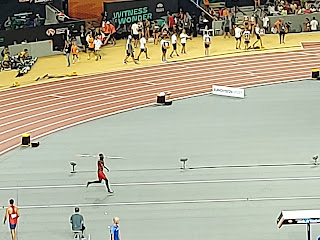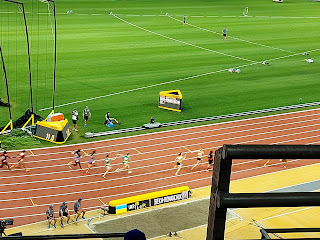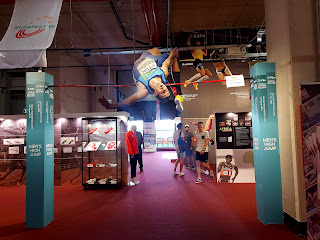Clicca qui per la versione italiana
Let's start from the bottom: the penultimate
day of the World Championships is over and Italy has four medals, France and
Germany zero (the latter still has some chance of winning one, the former
really does not). Something absolutely unimaginable not only six years ago,
after the disaster of London, but also two and a half, After London I hoped
that better times would come, we couldn't keep on "digging after hitting rock
bottom", but I didn't think so far and so fast.
But even more incredible was the women's' fourth
place. A medal from the men's relay was still conceivable, albeit difficult,
but if they had told me on the eve of the race that the women's 4X100 would
finish fourth, I would have thought of accidents or mass disqualifications. At
the second exchange the Ivory Coast falls down so Italy finds itself clearly
fourth, behind the USA, Jamaica and Great Britain. In the fanchor leg, while
Sha'Carri resisted Jackson's comeback for the title, Pavese resists Swoboda's
comeback and remains fourth.
It is an ideal arrangement: you can find a place without any problem and you can see the screen. The only drawback is the somewhat
high volume of the loudspeaker (both the speaker and the music), The first
passage I see is the return passage of the second lap, with a leading group of
26 athletes, including Epis. Among the pursuers I notice a Peruvian woman who
looks like she is running a middle-distance race. On the outward passage
of the third lap the Italian is losing contact, on the return lap the leading
group has shrunk to 11, which by the end of the lap has become 6 and a
kilometre later 4, all Ethiopians. While the speakers are chatting, one of the
leaders can be seen on the screen stopping: at the possible decisive moment of
the race, on the screen they show an interview, in Hungarian of course, done on
the stage in front of me. In the end, the leaders pass at the start of the last
lap, and they are three. On the return, which is the
40th km, the athletes pass one at a time, the first three within 20 seconds of
each other, the fourth, the Moroccan Gardadi, even further back. One kilometre
later, however, the fourth will have already overtaken the third, who will lose
another two positions.
After the arrival of Epis, who will recover
another position and finish 12th, I head towards the stadium. On the tram I
meet a German who has been to two World Championships that I skipped, Daegu
2011 and Beijing 2015 (but, if I understand correctly, not Doha): Germans and
Estonians will be the dominant presences this morning.
When the discus is over, besides going to the bathroom and getting some food (which they all do, with queues as a consequence), I move to the other side, to closely follow the pole vault (another thing that almost everyone does, apart from those who were already there). I arrive that there is already one athlete (Garland, seventh overall) with two faults at the opening height, 4.50: he will also miss the third, The same thing will happen to Nilsson at 4.80 and in the second group, to Owens-Delerme (so far sixth) at 4.40. In the first group, Neugebauer makes 5.10 and celebrates by going under the bend and calling a wave. First is Williams with 5.30. The second group, which started later, is left: I decide that I will watch it as long as the top ranked men, Warner and Victor, are in the race, then at 4.90 I see that it is getting late and I decide that it will be the last height anyway. The Canadian gets over it, but it will be the last one, the Grenadine does not.
In the evening I had arrived at my seat that
the first group of the decathlon javelin was in the third round and the pole
was finishing the first height, 5.55. Surprisingly, I discovered that the pole
was not where all the other races in the event were held. i.e. on the
side of the second bend, but on the outside of the track, where the other days
there were the horizontal jumps, a much more favourable position for me. In addition
to the Italians, you see many Spaniards, in all sectors, as well as the usual
Dutch, concentrated in my area. given the day, there are also many Swedes
The decathlon javelin featured athletes from
the second half of the ranking in the first group, those from the first half in
the second. In the first group, Estonian Oiglane exceeded 70 metres, in the
second Victor with 68, overtook Neubauer in third place. The 1500 would then
confirm the Lapage-Warber-Victor podium, with Tilga overtaking Neubauer in
fourth place. The athletes would not, however, be able to do their classic
collective victory lap, as the 4X100 was presented immediately: they had to
limit themselves to parading around the outside of the first bend.
The pole vault was another incredible race,
hardly imaginable until recently. The progression is very fast: 5.55-5.75-5.85,
then up 5 cm at a time. The 5.55 was clered by everybody on first or second, at
5.75 two came out, with Stecchi (whom the speaker in English, with his usual
horrendous pronunciations, called as if it was an English name, instead of "Stekki") saving himself in the
third. The 5.85 is cleared five, of whom three on them in the first. Among them the
Frenchman Collet, for whom I am beginning to wonder if I did not speak too soon
when I said that France would remain without medals. The doubts will increase
when he also clears 5.90 at the first, along with Nielsen and Obina, while
Duplantis will pass and Marschall will keep his attempts after his first
fault. Four clear the 5.95 on the first round, all except Collet, who keeps
his attempts after one miss. It is then 5 of them who try 6 metres:
Duplantis clears them ionfirst with his usual disarming ease, Obiena on second, the others are out, with Nielsen and Marschall tying for bronze.
Duplantis will also clear, somewhat less widely but still without any
problems, 6.05 and 6.10, while Obiena will miss the first once and the second
twice. Duplantis will then fail the record at 6.23. Five years ago I considered
a race with three over 5.95 and four over 5.90 incredible, today it was
four and five respectively.
There was also the women's shot put final, which,
at least for the first three rounds, I followed very little: from my position I
had difficulty realising the measures, even with binoculars, yet the field
was the same as for the men's race. At the halfway stage Ealey was leading
with 20.35 in the first throw, one entered the top eight with 19.26 and there were
only 37 centimetres between third and eighth. In the fourth round Gong and
Dogmo both threw 19.69, the Portuguese was currently third on countback, but in the next round the Chinese would overtake her. In the fifth
round, Ealey stretched to 20.43 and Canada's Mitton, already second, also
exceeded 20 metres (20.08). The last round is well followed because the only
other competition left is Duplantis' record attempt, but nothing happens.
People leave the stadium slowly, it is one of the days when it is fullest. The motto of these World Championships (also on the T-shirt I bought) is 'Witness the wonder': I did not think I would witness so much wonder, especially Italian one.






















































